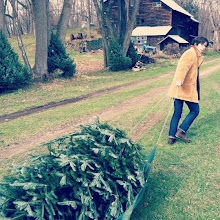
Begin your trip at dawn, going first to a freshwater marsh. Rails, bitterns, and other marsh birds are most active and vocal at that hour, and a few minutes in a marsh at sunrise can be more productive than several hours later in the day. From the marsh you can go to the woodlands, fields, or thickets. Until the middle of the morning most songbirds are busily searching for food and singing and are relatively easy to see...
-- National Audubon Society Field Guide to North American Birds Eastern Region --
Sunday morning I got up at 4:30 and rode the subway all the way to Inwood. I met my friend Jack at dawn, and together we climbed the hill that peers out over the northern tip of Manhattan. We wandered through the woods, down to the salt marsh, over to the fork where the Harlem River splits from the Hudson (called Spuyten Duyvil). In the middle of the park, there's a rock, pictured above, which marks the place where Peter Minuit bought the island of Manhattan from the Indians. We were trying to find birds.
Birding isn't easy. I think it's going to take hours and days and years of practice. You have to know where to look and what to look for. Once you spy a bird in the foliage, you have to train your binoculars on it despite the dizzy and disorienting change of perspective. I rarely managed the transition from naked eye to 10 x 50 magnification successfully. My neck got sore fast.
We would have done just as well, maybe even better, if we had started our trip well after dawn. We didn't find a freshwater marsh, or see rails or bitterns or an abundance of songbirds. We were probably a few weeks too early for any of those birds. But we did see thousands of robins, hundreds of bluejays, lots of cardinals, a handful of woodpeckers, and a few red-tailed hawks. And walking in the woods early in the morning, eyes and ears tuned to the smallest sights and sounds, is reward enough.
I love field guides. They feel great in your pocket, even better when you pull them out to read about something as you look at it. The red-tailed hawk's voice is a "high-pitched descending scream with a hoarse quality, keeeer." Red-headed woodpeckers (we saw one, our rarest find, flitting around a mammoth dead tulip tree) "often fly-catch, swooping low across a highway of along the shoulder of a road after flying insects," and "frequently are driven off by aggressive European Starlings, which occupy their nest holes."
Every so often, we would catch a tiny bird flitting high up in the branches. It was hard to find. Neither of us could hold still enough to get a positive fix on its features, let alone determine its identity. An Eastern Wood-Pewee? They are "more often heard than seen because of their dull coloration and because they frequent the dense upper canopy of the forest." My sore neck suggests it's a distinct possibility. Though it could have been a wren, a warbler, a vireo...


